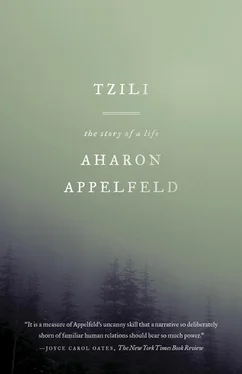In the afternoon the body was recovered from the lake and the funerals took place one after the other. One of the men, who had the look of a public official even in his rags, spoke at length about the great obligations which were now facing them all. He spoke about memory, the long memory of the Jewish people, the eternal life of the tribe, and the historic necessity of the return to the motherland. Many wept.
After the funeral there was a big argument and the words of the official were heard again. It appeared that the woman who had taken poison had taken it because of a broken promise: someone who wanted to sleep with her had promised to marry her, and the next day he had changed his mind. The woman, who in all the years of suffering had kept the poison hidden in the lining of her coat without using it, had used it now. And something else: before taking the poison the woman had announced her intention of taking it, but no one had believed her.
Now there was nothing left but to say: Because of one night in bed a person commits suicide? So what if he slept with her? So what if he promised her? What do we have left but for the little pleasures of life? Do we have to give those up too?
Tzili took in the words with her eyes shut. She understood the words now, but she did not justify any of them in her heart. She sensed only one thing: the grief which had washed through her too had now become empty and pointless.
NOW THEY STREAMED with the sun toward the sea. And at night they grilled silver fish, fresh from the river, on glowing coals. The nights were warm and clear, bringing to mind a life in which pleasures were real.
There was no lack of quarrels in this mixture. The summer sun worked its magic. As if the years in the camps had vanished without a trace. A forgetfulness which was not without humor. Like, for example, the woman who performed night after night, singing, reciting, and exposing her thighs. No one reminded her of her sins in the labor camp. She was now their carnival queen.
Now too there were those who could not stand the merriment and left. There was no lack of prosecutors, accusers, stirrers up of the past, and spoilsports. At this time too, the first visionaries appeared: short, ardent men who spoke about the salvation of the soul with extraordinary passion. You couldn’t get away from them. But the desire to forget was stronger than all these. They ate and drank until late at night.
“What are you doing here?” A man would accost her from time to time, but on seeing that she was pregnant he would withdraw at once and leave her alone.
Tzili was very weak now. The long march had worn her out. From time to time a pain would pierce her and afterward she would feel giddy. Her legs swelled up too, but she bit her lips and said nothing. She was proud that her legs bore her and her baby. For some reason she believed that if her legs were healthy no harm would befall her.
And her life narrowed down to little worries. She forgot everyone and if she remembered them it was casually and absentmindedly. She was with herself, or rather with her body, which kept her occupied day and night. Sometimes someone offered her a piece of fish or bread. When she was very hungry she would stretch out her hand and beg. She wasn’t ashamed to beg.
Without anyone noticing, the green creeks turned into a green plain dotted with little lakes. The landscape was so lovely that it hurt, but people were so obsessed with their merrymaking that they took no notice of the change. After a night of drinking they would sleep.
The convoy proceeded slowly and at a ragged pace. Sometimes a sudden panic took hold of them and made them run. Tzili limped after them with the last of her strength. They traipsed from place to place as if they were at the mercy of their changing moods. At this time fate presented Tzili with a moment of peace. Everything was full of joy — the light and the water and her body bearing her baby within it — but not for long.
During one of the panic flights she felt she could not go on. She tried to get up but immediately collapsed again. But for the fat woman, the one who sang and recited and bared her thighs — but for her and the fact that she noticed Tzili’s absence and immediately cried: “We’ve left the child behind”—they would have gone on without her. At first no one paid any attention to her cry, but she was determined to be heard. She called out again, with a kind of authority, like a woman used to raising her voice, and the convoy drew to a halt.
No one knew what to do. During the years of the war they had learned to run and to stop for no one. The fat woman made them stop. “Man is not an insect. This time no one will shirk his duty.” A sudden shame covered their faces.
There was no doctor among them, but there was a man who had been a merchant in peacetime and claimed that he had once taken a course in first aid, and he said: “We’ll have to carry her on a stretcher.” Strange: the words did their work at once. One of them went to fetch wood and another rope, and the skinny merchant, who never opened his mouth, knelt down and with movements that were almost prayerful he joined and he knotted. And they produced a sheet too, and a ragged blanket, and even some pins and some hooks. By nightfall the merchant could survey his handiwork and say: “She’ll be quite comfortable on this.”
And the next day when the stretcher bearers lifted the stretcher onto their shoulders and set out at the head of the convoy, a mighty song burst from their throats. A rousing sound, like pent-up water bursting from a dam. “We are the torch bearers,” roared the stretcher bearers, and everyone else joined in.
They carried the stretcher along the creeks and sang. The summer, the glorious summer, turned every corner golden. Tzili herself closed her eyes and tried to make the giddiness go away. The merchant urged the stretcher bearers on: “Run, boys, run. The child needs a doctor.” All his anxieties gathered together in his face. And when they stopped he would sit next to her and feed her. He bought whatever he could lay his hands on, but to Tzili he gave only milk products and fruit. Tzili had lost her appetite.
“Thank you,” said Tzili.
“There’s no reason to thank me.”
“Why not?”
“What else have I got to do?” His eyes opened and in the white of the left eye a yellow stain glittered. His despair was naked.
“You’re helping me.”
“What of it?”
And Tzili stopped thanking him.
At night he would fold his legs and sleep at her side. And Tzili was suddenly freed of the burden of her survival. The stretcher bearers took turns carrying her from place to place. There was not a village or a town to be seen, only here and there a house, here and there a farmer.
“Where are you from?” asked Tzili.
The merchant told her, unwillingly and without going into detail, but he did tell her about Palestine. In his youth he had wanted to go to Palestine. He had spent some time on a Zionist training farm, and he even had a certificate, but his late father had fallen ill and his illness had lasted for years. After that he had married and had children.
There was nothing captivating in the way he spoke. It was evident that he wanted to cut things short in everything concerning himself, like a merchant who put his trust in practical affairs and knew that they took precedence over emotions. Tzili asked no further. He himself left the stretcher only to fetch milk for her. Tzili drank the milk in spite of herself, so that he would not worry.
He never asked: “Where are you from?” or “What happened to you?” He would sit by her side as dumb as an animal. His face was ageless. Sometimes he looked old and clumsy and sometimes as agile as a man of thirty.
Читать дальше












